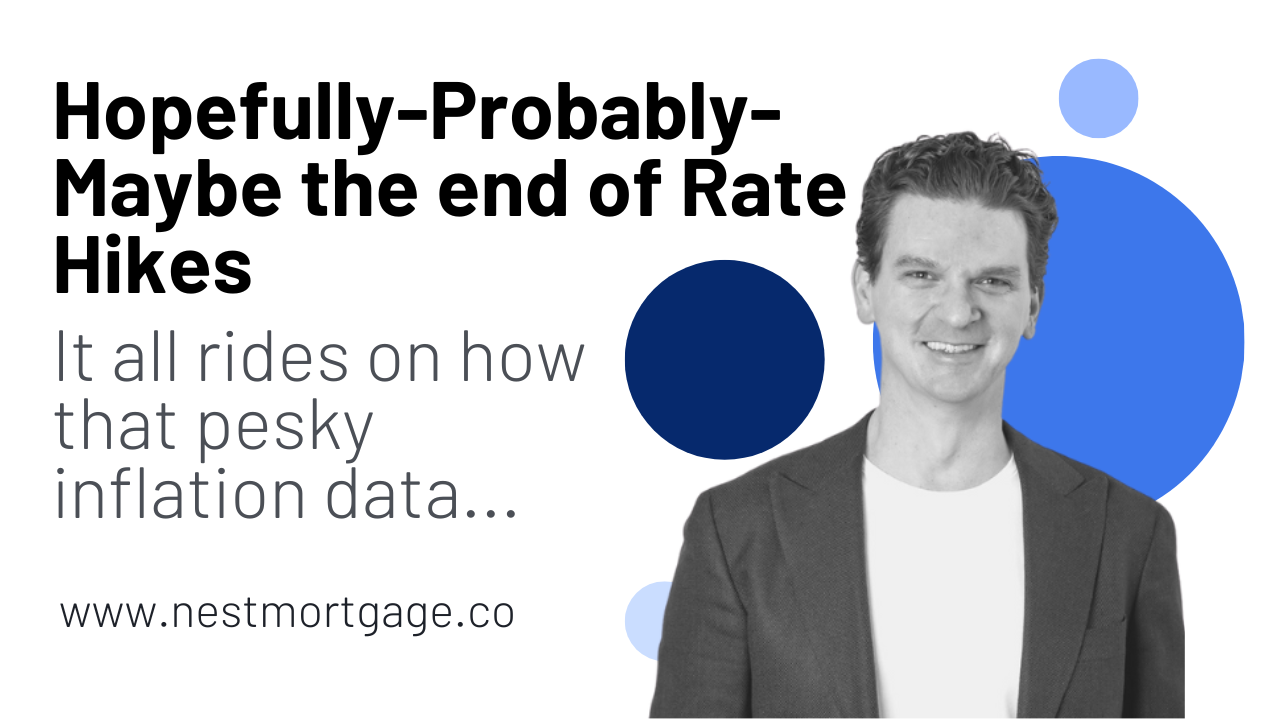September 7, 2023
Hopefully-Probably-Maybe the end of Rate Hikes
It all rides on how that pesky inflation data...
Governor Tiff Macklem and the Bank of Canada (BoC) announced this morning there would be no change to the Overnight Rate. A though the BoC hasn't been shy about making moves that defy market expectations - today's hold was universally anticipated. Economic data in the week's leading up today's announcement are starting to reflect the bite higher interest rates are taking out of the economy. And I know we've seen this movie before - but it's starting to look like interest rates may have peaked. Hopefully for real this time.
Why should this time be any different? Well this time, there is far more data to suggest higher rates are impacting the economy in significant ways. Take second quarter GDP numbers: They not only missed the target, they landed in a completely different area code. Seeing the Canadian economy contract by 0.2% against expectations of 1.2% to 1.5% growth is sobering for a couple of different reasons:
- We have seen the most significant population growth in more than a generation. A growing population consumes goods and services and increases the labor force. It should be gas on a fire
- Interest rates take 12+ months to take their full effect. If we wind the clock back to Q2 of 2022 - we saw a 1.25% total increase. In Q3 2022 - there was another 1.75% in rate hikes. Needless to say, July 2023 GDP numbers are off to a slow start as more rate hikes come of age
In conjunction with the GDP numbers, total retail sales (consumption) in Canada have plateaued (article here). Once those consumption numbers are adjusted on a per capita basis, we can begin to see that spending is weighed down by these higher interest rates. Throw in an unemployment rate that has increased by 0.5% over the last 3 months and it becomes really difficult to see why any additional rate hikes would be necessary. Yes - inflation is still running too high and will be more challenging to bring into line. However, slower growth and spending is likely to be the solution here. It's time - not further increases we're likely dealing with.
Moving Forward
What we're all looking for here is clarity. A clear signal and path laid out before us. The problem is that we're really only pretty good at predicting the next step. Anything beyond that is pure guesswork. And so what we're aiming to do is manage risk. The majority of experts are now predicting that the Bank of Canada has hit it's ceiling. Inflation is and was always going to be the last domino to fall on our way to lower interest rates. And until we see sustained progress reflected in the core metrics, the risk will be for a further increase. But that outcome is looking less and less likely.
What we are seeing today and are likely to see more of going forward is some downward pressure on fixed interest rates. This is a direct result of the unimpressive economic data pulling forward expectations of rate cuts. As more data points (ie. the labor force survey on September 8th) reflect a slowing economy, the more downward pressure we'll begin to see. Inflation is likely to stay on the high side for a while here and bounce around a little bit as year over year metrics filter in and out. But unless it's joined by a rebound in GDP growth or spending, it likely won't be enough to move the Bank of Canada off the sidelines.
On the other side of these numbers are people looking to make sense of things. And we're here to help. If you're looking for some guidance, please reach out. Whether is't buying a home or refinancing to free up some cash flow, we can help you find the answers that are right for you. Please reach out!
All the best out there!

